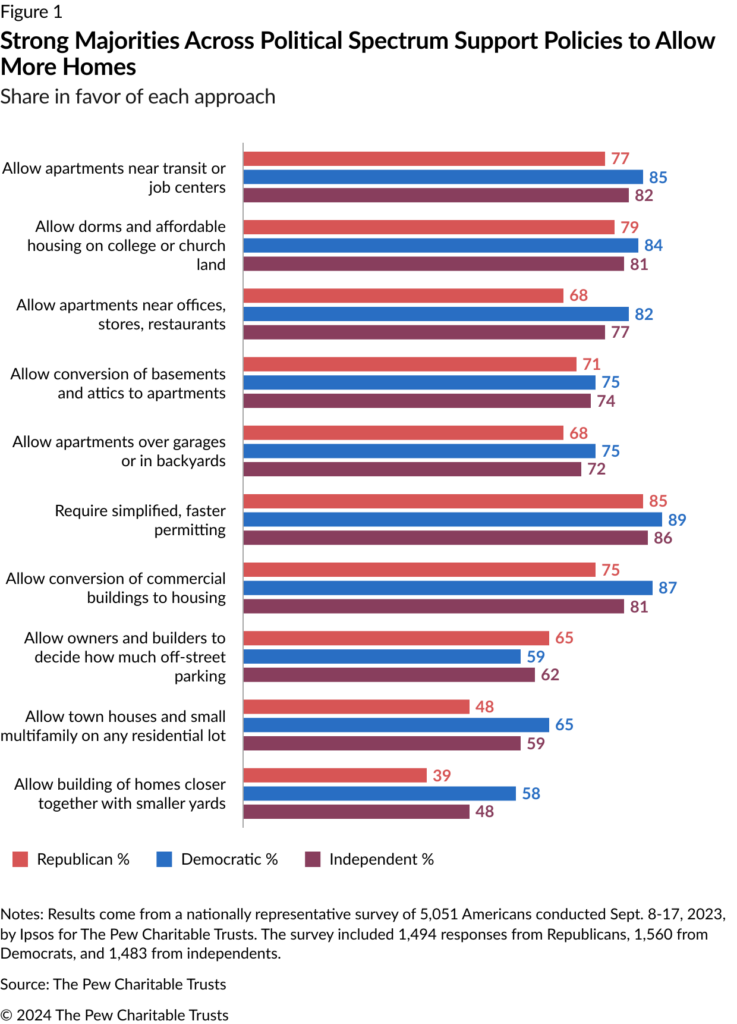The Volokh Conspiracy
Mostly law professors | Sometimes contrarian | Often libertarian | Always independent
Conflicting Evidence on Public Support for YIMBY Zoning Reform
Recent studies diverge on the extent to which public opinion backs policies that would deregulate housing construction. YIMBYs would do well to learn from both.

Curbing exclusionary zoning and other regulatory barriers to housing construction is essential to reduce housing costs, enable more people to vote with their feet and "move to opportunity," make the economy more productive, and protect property rights. A bipartisan, cross-ideological "YIMBY" ("yes in my backyard") movement has arisen to promote housing deregulation.
YIMBY policies command broad support among economists and land-use experts across the political spectrum. But how popular are these ideas with the general public? Two recent studies give diverging answers to that question. A September 2023 survey conducted by Pew Charitable Trusts finds broad support for a wide range of YIMBY policies, cutting across partisan lines. By contrast, a recent study by legal scholar Chris Elmendorf and political scientists Clayton Nall and Stan Oklobdzija (ENO) is far more equivocal, finding much less support for housing deregulation.
Which is right? I suspect the truth lies somewhere in between. It may well be that many voters don't know much about these issues, don't have strong opinions about them, and therefore their views (and answers to survey questions) may vary a lot based on context and framing.
The Pew survey finds large majorities supporting many different deregulatory housing policies.

Notice that every one of these policies has the support of a large majority, with the exception of allowing homes to be built closer together, with smaller yards, where respondents are evenly divided (49% for, 50% against). Most significantly, a clear majority (58%) supports allowing construction of multifamily homes on any residential lot. This would eliminate single-family-only zoning, the most widespread and pernicious type of exclusionary zoning. It is also notable that Democrats and independents tends to back YIMBY reforms more than Republicans do, despite the latter's reputation as being more sympathetic to property rights.
The Pew study also finds large majorities backing a wide range of rationales for housing policy change, including "To enable people to live closer to offices, stores, restaurants or public transportation" (77% say this is either an "excellent" or "good" rationale for policy change), and "To make housing more affordable" (82%), and "To help boost local economies by helping business owners have more potential employees and customers nearby" (76%). Most impressively, 65% say it would be excellent or good to adopt housing policies that "give people more freedom to do what they want with their property." Almost all building restrictions infringe on homeowners' property rights in that way!
By contrast, the ENO study is far more pessimistic about public support for YIMBYism. Here is the abstract summarizing their findings:
How much has rising political attention to problems of housing affordability translated into support for market-rate housing development? A tacit assumption of YIMBY (``Yes In My Backyard'') activists is that more public attention to housing affordability will engender more support for their policy agenda of removing regulatory barriers to dense market-rate housing. Yet recent research finds that the mass public has little conviction that more housing supply would improve affordability, which in turn raises questions about the depth of public support for supply-side policies relative to price controls, demand subsidies, or restrictions on ``Wall Street'' investors, to name a few. In a national survey of 5,000 urban and suburban voters, we elicited perceptions of the efficacy of a wide range of potential state policies for ``helping people get housing they can afford.'' We also asked respondents whether they support various housing and non-housing policies. Finally, as a way of estimating the revealed importance of housing-policy preferences relative to the more conventional grist of state politics, we elicited preferences over randomized, three-policy platforms. In a set of results that recall the politics of the inflation-ridden 1970s, we find that homeowners and renters alike support price controls, demand subsidies, restrictions on Wall Street buyers, and subsidized affordable housing. The revealed-preference results further suggest, contrary to our expectations, that price controls and anti ``Wall Street'' restrictions are very important to voters. Contrary to the recommendations of housing economists and other experts, allowing more market-rate housing is regarded as ineffective and draws only middling levels of public support. Opponents of market-rate housing development also care more about the issue than do supporters. Finally, we show that people who claim that housing is very important to them don't have distinctive housing-policy preferences.
The major differences between the Pew survey and the ENO study are that the latter asks more complicated and detailed questions, and that they intersperse questions about YIMBY policies with questions about pro-regulatory policies (e.g. - rent control and restrictions on developers), which most experts consider to be ineffective (rent control has a particularly bad reputation among those in the know), but which are clearly popular with many voters. ENO also leave more room for uncertainty and ambiguity (including allowing "don't know" answers), whereas the Pew questions have a "forced choice" format, with no "don't know" or "uncertain" option. The latter approach probably elicits more weakly held views than the former.
I also think the Pew question wording is relatively more favorable to YIMBY policies (sometimes implicitly suggesting they are likely to increase supply), while ENO's question wording often cuts the other way. ENO also include questions that reference corporate and developer interests, which may trigger "anti-market bias" and "supply skepticism." An earlier ENO study found that many people don't understand basic economics of housing and don't believe increasing supply is likely to reduce prices, suspecting instead that it will just benefit nefarious financiers and developers.
Interestingly, while the Pew study finds that Democrats are more supportive of deregulatory YIMBY policy than Republicans, ENO find the exact opposite. I think that, too, is an effect of question wording. The ENO questions more often often refer to developers and corporations, thereby triggering left-wing suspicion of capitalist interests.
Activists and politicians love to tout poll results that indicate their positions are popular, while denigrating those that suggest the opposite. I'm a big supporter of YIMBYism, and therefore wish I could say the Pew survey is right and ENO are wrong. But the truth is far more complicated than that. If anything, the ENO study is the more extensive and sophisticated of the two. As a longtime scholar of voter ignorance, I am well aware that many bad policies are popular, and that I myself have many unpopular views.
What the combination of the two studies shows is that public perceptions of housing policy are heavily influenced by frames and question-wording. If you ask about YIMBY policies in isolation, and imply they may increase the availability of housing and reduce costs, you will get strong majority support for them. If you have less favorable question wording, reference capitalist interests, and include questions about increased regulation, you get more negative results.
Similarly, if you frame deregulation as "giv[ing] people more freedom to do what they want with their property," it will get more support than if you frame it as letting developers and other business interests do what they want - even though these two are often the exact same thing! Business interests are owners, too, after all, and one of the things that an ordinary property owner might want the "freedom" to do with her land is sell it to a developer to build new housing that can accommodate more people.
Both the seller and the developer may be motivated by profit, rather than any high-minded desire to increase affordable housing. But, to paraphrase Adam Smith's famous statement about butchers, brewers and bakers: "It is not from the benevolence of the builder and the developer, that we expect our housing, but from their regard to their own interest."
While ENO use a more sophisticated methodology, it's not clear their approach better captures voters' responses to real-world political campaigns. In the real world, voters rarely carefully compare a wide range of policy options with nuanced wording. They often just see or hear about just one or two ideas at a time. Thus, I still think libertarians and YIMBYs would be well-advised to use referenda to promote their policies, in states where it is relatively easy to get questions on the ballot. A referendum question focuses on one policy at a time, and can be worded in a way that creates a favorable frame. Effective framing might also facilitate passage of traditional legislative proposals.
That said, ENO are right to warn that increased public focus on housing issues won't necessarily lead to better policy. Even if more YIMBY reforms get adopted, they may be vitiated by populist policies that actually make housing harder to build:
Our results imply that the more the public tunes in, the more likely it is that the hoped-for balance will be upset by populist candidates demanding stricter rent controls, tighter limits on corporate ownership of housing, and ever more demanding standards for deed-restricted affordability in new projects. Some relaxation of zoning restrictions may be achieved, but its effect is likely to be vitiated by a host of other requirements that make new housing economically infeasible to build.
This warning is well taken. But it doesn't mean YIMBYs should eschew political action entirely, or even that they should always avoid calling greater attention to housing issues. Far from it. still, the threat of ignorance-driven populism should engender some caution. It also reinforces the case for combining political action with strategic litigation, using the Takings Clause of the Fifth Amendment and various state constitutional provisions. Such a combination of strategies has served many previous reform movements well, and could work for this one, too.


Show Comments (21)